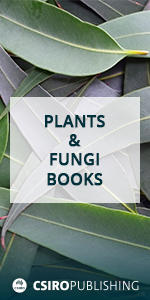
Functional Plant Biology
Volume 40 Number 6 2013
FP12309Tropical forest responses to increasing atmospheric CO2: current knowledge and opportunities for future research
Elevated atmospheric CO2 concentrations ([CO2]) will affect the metabolism of tropical forests worldwide; however, critical aspects of the response largely remain unknown. Here, we review the current state of knowledge, aiming to provide a framework that can guide future experimental research. Tropical forest CO2 enrichment experiments are urgently needed to test predictions of tropical forest functioning as atmospheric [CO2] rises.
FP12309 Abstract | FP12309 Full Text | FP12309PDF (1.3 MB) Open Access Article
FP12326Analysis of the expression of terpene synthase genes in relation to aroma content in two aromatic Vitis vinifera varieties
Grape flavour management requires knowledge of the derivation of individual aroma characteristics, the main constituents of which are terpenoids. Information about the expression patterns of the genes that are responsible for terpenoid biosynthesis is important. The genes identified in this study on terpene synthase gene transcript profiling in different tissues of two aromatic grapevine varieties will be of interest to viticulturists to improve decision making along the chain of production.
FP12347Ripening of grape berries can be advanced or delayed by reagents that either reduce or increase ethylene levels
The role of ethylene in controlling the development of nonclimacteric fruit is unclear. Application experiments using an ethylene-releasing compound and an ethylene biosynthesis inhibitor, as well as changes in expression of ethylene biosynthesis and perception genes, provide evidence for the complex involvement of ethylene in grape berry ripening. The ripening-altering properties of ethylene could benefit the wine industries in the face of environmental changes due to climate change.
FP12312Can early vigour occur in combination with drought tolerance and efficient water use in rice genotypes?
Early vigour and drought tolerance are crucial to increase and stabilise rice yield. We explored the genetic diversity of japonica rice under drought for traits related to early vigour, hydraulic processes and water use. Our results suggested a negative linkage between early vigour and its maintenance under drought. The limits and opportunities for improving drought tolerance in rice without affecting early vigour are discussed.
FP12254Comparative performance of δ13C, δ18O and δ15N for phenotyping durum wheat adaptation to a dryland environment
The usefulness of non-carbon stable isotope abundances in dry matter as phenotypic tools for selecting plants better adapted to stress remains inconclusive. This study shows for wheat under Mediterranean conditions that carbon followed by nitrogen isotope abundances exhibited useful characteristics, whereas oxygen isotope abundance performed poorly by comparison. The advantages and limitations of the combined use of these isotopes are discussed.
FP12251Differential response of root proteome to drought stress in drought sensitive and tolerant sunflower inbred lines
The understanding of drought tolerance mechanisms is a major challenge for plant biologists. A proteomics approach was adapted to uncover molecular mechanisms of drought tolerance in sunflower roots. We found significant changes in abundance of proteins involved in energy usage, water transport and activation of defence systems. The results indicate that these processes are important for maintaining root growth as the soil dries and that modulation of these proteins could improve sunflower yield and oil productivity under drought.
FP12329Germanium as a tool to dissect boron toxicity effects in barley and wheat
In boron-toxic soils, boron accumulates in the leaves of wheat and barley, causing leaf necrosis. Although progress has been made towards identifying the mechanisms and genes responsible for limiting boron’s entry into plants, it is unclear why some tolerant plants develop fewer toxicity symptoms. We show that the symptoms of germanium toxicity mimic those of boron toxicity. Germanium may be used to dissect the genetic control of symptom development.
FP12350Improved stomatal regulation and ion partitioning boosts salt tolerance in grafted melon
Vegetable grafting is currently adopted for improving plant responses to environmental stresses, such as salinity. Melon scions are generally grafted on interspecific rootstocks. In this study, the different components of salinity stress (osmotic stress, ion toxicity and nutritional imbalance) are addressed in nongrafted, self-grafted and interspecific graftings. Grafting per se improved plant water status, whereas the interspecific rootstock is responsible for reduced ion toxicity and nutritional imbalance.
FP12313Changes in xylem tissue and laccase transcript abundance associated with posture recovery in Chamaecyparis obtusa saplings growing on an incline
When a gymnosperm grows on an incline, special tissue referred to as ‘compression wood’ forms on the lower side of the stem to restore the stem’s vertical orientation. We observed the posture recovery and stem anatomy of saplings grown on an incline and examined the expression of laccase, which plays a significant role in the formation of compression wood. Based on the results, mechanisms of posture control in gymnosperm trees are suggested.




